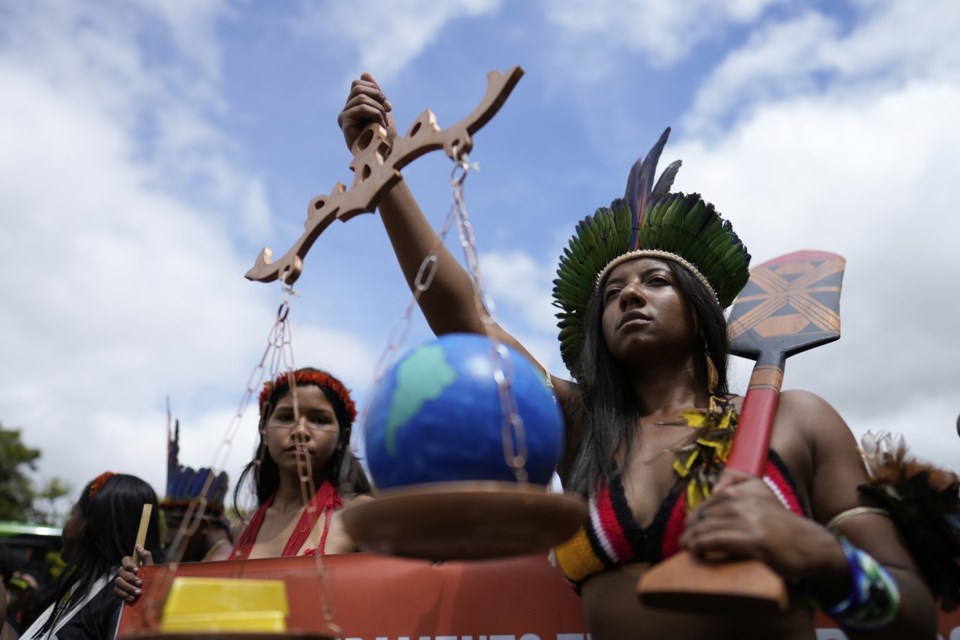BRASILIA, Brazil (AP) — With the first U.N. climate talks in the Amazon approaching, thousands of Indigenous people marched Tuesday in Brazil’s capital, demanding the state guarantee and expand their rights to traditional lands as part of the solution to the world’s climate crisis.
The protest is the high point of the annual Free Land Indigenous Camp, now in its 21st edition. Bearing messages such as “Land rights = Climate Action,” they walked toward Three Powers Square, where Congress, the Supreme Court and the presidential palace are located in Brasilia.
“Indigenous territories are the most preserved and contribute to slowing the climate crisis we’re facing. But they are also the first to be impacted,” said Luene Karipuna, from the Amazonian state of Amapá, while marching. “We feel it directly in our lands, where we lost our entire cassava crop — our staple food in my community.”
Thirteen percent of Brazil´s territory consists of recognized Indigenous lands, most of it in the Amazon.
In the past two years, the Amazon basin has suffered its worst drought on record, leading to a surge in wildfires, isolation for river communities, crop losses and the death of wildlife, including the endangered pink dolphin. Some studies have linked the region´s extreme weather to climate change.
Like several other Indigenous leaders, Karipuna plans to attend the climate talks — also known as COP30 — in November in the city of Belem. They hope the event will be a chance to promote land demarcation and other Indigenous rights in all Amazon countries, and are pressing for a greater role during the event.
“This is a historic COP for the social movement. It’s a key moment for all Indigenous peoples to show that we are alive,” said Juan Carlos Jintiach, an Indigenous leader from Ecuador and executive secretary of the Global Alliance of Territorial Communities, an international organization representing Indigenous peoples from Latin America, Africa and Asia.
Last year, the Indigenous movement had called for the nomination of a co-president for COP30. The proposal was rejected, but the conference’s president, Brazilian climate secretary André Corrêa do Lago, pledged to create a so-called Circle of Indigenous Leadership “to help integrate traditional knowledge and wisdom into global collective intelligence.”
Dinamam Tuxá, coordinator of the Articulation of Indigenous Peoples of Brazil, said they are frustrated by the rejection of the co-presidency proposal and are still analyzing Lago’s plan.
“The COP is a political moment when countries come together to negotiate the climate crisis, but unfortunately it does not engage directly with Indigenous peoples at the negotiation tables — even though we are the main defenders of these territories and are actively fighting climate change,” Tuxá told the AP.
Satellite data show that Indigenous territories in the Amazon — a region twice the size of India — have very low deforestation rates. The world’s largest tropical forest is a major carbon sink and climate regulator, and it holds 20% of the planet’s fresh water.
___
The Associated Press’ climate and environmental coverage receives financial support from multiple private foundations. AP is solely responsible for all content. Find AP’s standards for working with philanthropies, a list of supporters and funded coverage areas at AP.org.
Fabiano Maisonnave, The Associated Press



